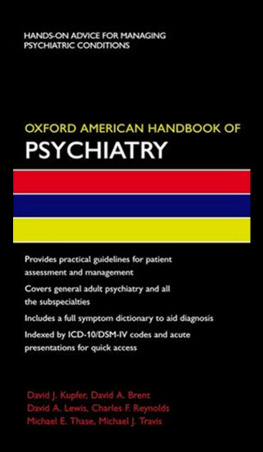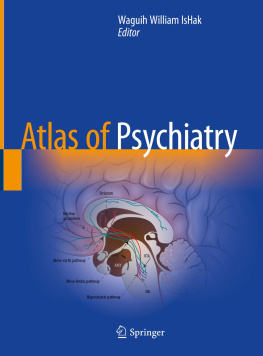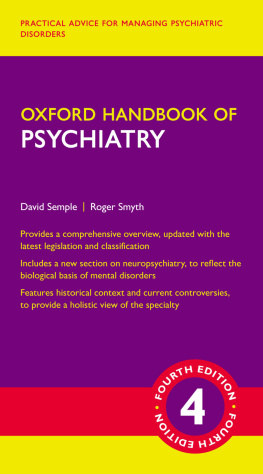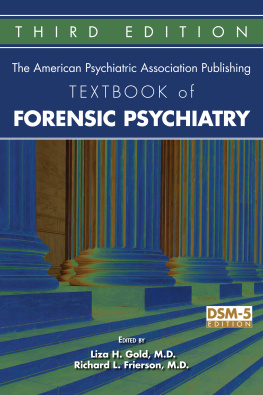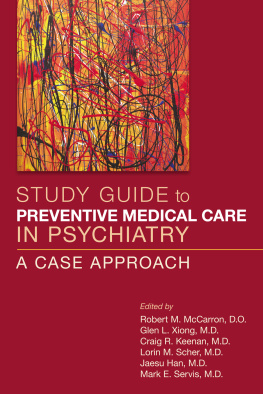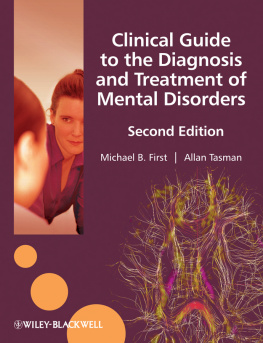1. Thinking About Psychiatry
Psychiatry: Past and present
Now is the most exciting time to be working in the field of psychiatry. Since the beginning of recorded history, mental or psychiatric illnesses (or disease) have been regarded with fear, disbelief, and superstition. These attributions have often been accompanied by fantastic descriptions of both the causes and treatments of these illnesses.
Unfortunately, there exists a false separation of psychiatric illnesses from physical illnesses, despite conclusive proof that all of the core psychiatric diseases are associated with changes in brain function or structure or both. This separateness means that psychiatry remains dogged by stigma, even from our colleagues in other medical specialties.
Psychiatric diseases are more common than almost any other type of disease and among the most serious chronic conditions from which a person can suffer in terms of morbidity and shortened life expectancy. The important World Health Organization (WHO) and World Bank studies and analyses continue to substantiate this point of view.
To truly understand psychiatry, one has to consider the centrality of the brain and its functioning to the organism as whole. Furthermore, the brain is an organ that develops and changes throughout life. Everything that an individual experiences in their life, every emotion, every memory, every interaction is processed by this changing organ. The human body comprises a system of pumps, filters, glands, conduits and mechanical systems whose primary aim is to support the brain, the organ that controls the system as a whole and the complexity of whose function makes us human.
To separate mind from body is akin to trying to divorce the function of the heart from that of the lungs, since disease in one can lead to malfunction and disease in the other. The brain is as intimately connected with all the organs of the body as the right ventricle is to the pulmonary arteries. It, therefore, follows, and is clear from the literature, that there are psychiatric sequelae from physical illness just as there are physical sequalae from psychiatric illness.
One of the perceived problems with psychiatry has been that the majority of diagnoses and treatments are based on the subjective description of symptoms by the sufferer and, therefore, somehow, the diseases are less valid than those where a rapidly available test can indicate the presence or absence of disease. Nevertheless, one needs to ask,
What would be the consensus on the diagnosis in a malaised male patient describing nausea, acute right lower quandrant abdominal pain and a reluctance to move because of the pain'?
How is that different from the consensus on, an ill-kempt patient describing low mood and hopelessness over the last month accompanied by a loss of appetite and concentration, and waking at four every morning?
Further, would you tell the patient with acute appendicitis to pull himself together?
Much of our diagnosis in medicine as a whole is still conducted on the basis of the history from the patient. A physical examination is little different from a mental status examination in its attempt to elicit or observe further symptoms and signs of illness to confirm or refute the diagnosis based on the history. Laboratory procedures are important in medicine, but such procedures need to be integrated with the rest of the information often obtained from the patient and family members.
The complexity of the brain in comparison with the relative simplicity of the other organs in the body make a simple test for disease more intellectually challenging to discover but not impossible. The primary challenge is the fact that the brain is several orders of magnitude more complex than any other organ in the body. Furthermore, unlike the heart or the kidney, the brain cannot be easily studied in isolation, without reference to the organ systems that the brain controls and that in turn affect the brain's own functioning. Nevertheless great strides have been made over the last 20 years. The growth in our understanding of the complexity of the challenge and the possible answers has grown exponentially with the integration of different modalities of investigation.
Psychiatry: The future
The next 20 years will see key opportunities for further understanding of the causes and treatments of psychiatric illness and, as importantly, how this relates to the health of the rest of the human organism and the reciprocal nature of this interaction. In tandem with these discoveries, the study of brain development and physical development through the lifespan will lead to a reconceptualization of health and disease in all organ systems including the brain.
This reconceptualization is an ongoing process that probably formally started with ensuring that populations had access to clean water to prevent cholera and has progressed to the modern day. Today, people are placed on a medication because the level of cholesterol in their blood is raised above a certain threshold and/or are advised to reduce their stress levels in order to prevent a vascular event.
Similarly, the further understanding of the ordinary development of the brain and the changes in cortical processing that are associated with diseases of all kinds will lead to preventative interventions, many of them lifestyle based, and where these are not possible, to more effective treatments of disease.
Psychiatry and psychiatrists, because we are physicians, will be at the forefront of this endeavor.
The seven ages of manThe Psychiatric Lifespan
All the world's a stage,
And all the men and women merely players;
They have their exits and their entrances,
And one man in his time plays many parts,
His acts being seven ages. At first, the infant,
Mewling and puking in the nurse's arms.
Then the whining schoolboy, with his satchel
And shining morning face, creeping like snail
Unwillingly to school. And then the lover,
Sighing like furnace, with a woeful ballad
Made to his mistress' eyebrow. Then a soldier,
Full of strange oaths and bearded like the pard,
Jealous in honour, sudden and quick in quarrel,
Seeking the bubble reputation
Even in the canon's mouth. And then the justice,
In fair round belly with good capon lined,
With eyes severe and beard of formal cut,
Full of wise saws and modern instances;
And so he plays his part. The sixth age shifts
Into the lean and slippered pantaloon
With spectacles on nose and pouch on side;
His youthful hose, well saved, a world too wide
For his shrunk shank, and his big manly voice,
Turning again toward childish treble, pipes
And whistles in his sound. Last scene of all,
That ends this strange eventful history,
Is second childishness and mere oblivion,
Sans teeth, sans eyes, sans taste, sans everything.
From William Shakespeare, As You Like It, 2. 7. 139-167.
What is disease?
Most psychiatric diagnoses have had their validity questioned at several points in their history. Diagnosed by physicians on the basis of symptoms alone, some people found their presence difficult to accept in a field that had been almost universally successful in finding demonstrable physical pathology or infection. With recent findings from neuroimaging, neuropathology, and genetics, it has become increasingly clear that there is a definite but very complex and heterogeneous pathology underlying many mental diagnoses.
It must also be remembered that disease in medicine as a whole was not always based on pathology. The microscope was developed long after doctors began to make disease attributions. Thomas Sydenham developed the medico-pathological model based on symptoms, but it has grown to incorporate information obtained from postmortem and tissue examination. This model of disease has become synonymous in many peoples' mind with a model based solely on demonstrably abnormal structure. Thomas Szasz (

